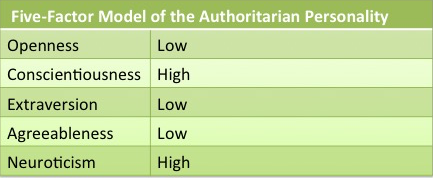Personality
What Type of Person Chants "Send Her Back?"
Chanters explained using a five-factor model of the authoritarian personality.
Posted July 22, 2019
On Wednesday, July 17, at a Donald Trump re-election rally in North Carolina, a crowd of people chanted “send her back” in reference to Rep. Ilhan Omar (D – Minn) and her country of origin, Somalia, from which she escaped as a refugee when she was a child. The media has been ablaze with news articles covering this event since.
A recent article published in The Atlantic pointed out that the specific phrase “send her back” is listed on the Equal Employment Opportunity Commission (EEOC) official webpage as an example of discrimination based on national origin should a co-worker or boss use the exact same phrase. A Washington Post article summarized the linguist, George Lakoff, whose viewpoint holds that both the “lock her up” and “send her back” chants dehumanize the person whom the chant is about by omitting their name and replacing it with the female pronoun, adding a dimension of sexism to what has widely been described as a racist chant. What are the personality characteristics of the chanters? In light of such recent events, it seems relevant to consider the factors underlying the "chanter" or “demagogue follower” type of personality.

Construct Definition
Individuals who follow or are prone to follow gurus, cult leaders, or demagogues have been labeled “the authoritarian personality” in abnormal, social, and personality psychology historical literature. The authoritarian personality has been described as rigid, concrete, orderly, hierarchical, and paranoid. Authoritarian individuals have been conceptualized as likely to display ethnocentrism, prejudice, fatalism, and a proneness to follow a demagogue among other traits.
A Five-Factor Model of the Authoritarian Personality
The Five-Factor Model (FFM) of personality has been used to describe both normal and abnormal personality functioning. It is perhaps the most widely used, gold-standard model of personality in academic psychology. It was derived from a factor analysis of descriptions of people found in everyday language use. Commonly known by the acronym “OCEAN,” the Five-Factor Model holds that five broad traits comprise the totality of the human personality. These traits are openness, conscientiousness, extraversion, agreeableness, and neuroticism.

- Openness refers to creativity, intellectual and aesthetic curiosity, and generally tolerant attitudes. Therefore, low openness can be considered characteristic of the authoritarian personality.
- Conscientiousness refers to dutifulness, self-restraint, and adherence to rules. Accordingly, the authoritarian personality can be conceptualized as high conscientiousness.
- Extraversion refers to sociality, talkativeness, and being outgoing. Authoritarian types of individuals have been described as heavily concerned with propriety and decorum, putatively appearing aloof, disinterested, or disapproving in social situations. It can be predicted that authoritarianism is linked with low extraversion.
- Agreeableness refers to emotional and interpersonal warmth. Authoritarians have generally been conceptualized as rigid, impersonal, and cold; therefore, they are putatively low in agreeableness.
- Neuroticism refers to anxiety, depression, stress, worry, and negative affective states generally. While conceptually linking levels of neuroticism to the authoritarian personality may be less logically straightforward as compared to the other factors, it can still be hypothesized that authoritarians are high neuroticism because they have been shown to be distrustful of others, paranoid, and preoccupied with issues of shame and humiliation.
In summary, authoritarian chanters can be described using the five-factor model of personality as described in the table below:

Implications and Applications
For the past several years the company, Cambridge Analytica, has been in the news for creating “psycho-graphic” profiles of Facebook users such that they could reportedly create personality-based political ads. What – if any – personality pattern explains and describes individuals targeted by Cambridge Analytica who later went on to become chanters? Extant literature suggests that the answer is the authoritarian personality type. However, short of being privy to Cambridge Analytica’s “psycho-graphic” database linked with exit polling data, it remains – at least, in part – an empirical question with considerable implications for political advertising, marketing, and government.


